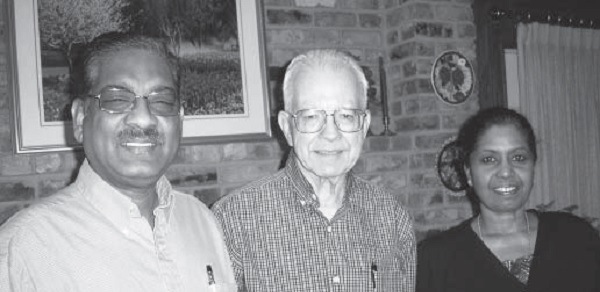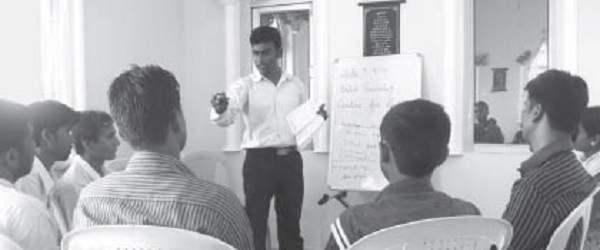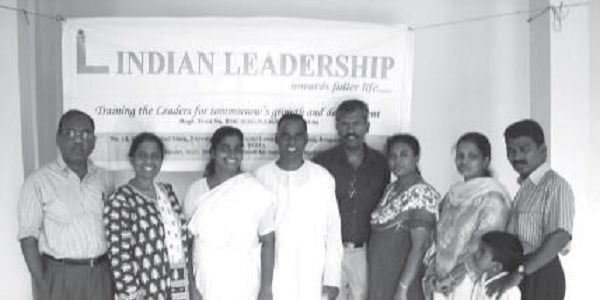into the depths
Exclusive interview with Pastor Samuel Madavaraj, founder of TELL International Inc.
Interview/Yu Guoliang
Translation/Zhang Qunmei

My father served God faithfully in the Indian city of Chenna for forty-five years, and my mother also devoted herself to the service. They laid a good spiritual foundation for me and allowed me to grow in the fertile ground of Christian faith. In 1961, when I was ten years old, I accepted Jesus as my personal Savior in a cemetery.

▲The Masams (left and right) take a photo with Dr. Roy B. Zuck, professor emeritus of Dallas Theological Seminary, who provides the biblical foundation for leadership training courses.
Deciding for Christ in the Cemetery
That was a very unique experience! That day, my beloved grandmother was buried. I loved her very much. When I saw family, friends, and relatives gathered together, although they were sad, everyone used singing, praying, and other solemn and peaceful ways to bury my grandmother. I thank God because she is a Christian.
Public cemeteries were meant to be used by people of different religions. When my grandmother's coffin was laid in the ground, not far away, the body of another Hindu was being cremated. I was very surprised that someone hit the body with a stick. Later I learned that the body would move due to the extremely high heat during cremation and the contraction of muscles and bones. The man had to hit the body first to loosen the muscles and bones so that it would not fall to the ground. When I was young, when I saw this scene, I couldn't help but ask my mother, "Why is that man beating people to death?"
My mother took this opportunity to share the gospel with me. She said, "Your grandmother is already a Christian. She believes that Jesus is the Son of God, died on the cross for her sins, rose from the dead and lives forever. Because of her faith, she is now with Jesus in heaven. , forever. This is why even though we feel reluctant to give up, we still sing hymns to praise God for giving her eternal life, but those who are not Christians are separated from Jesus forever because they do not know God. They have died and will be beaten by others. .
At this time, my mother asked me seriously: "My child, do you believe in Jesus? If you believe, you will be reunited with your grandmother in heaven after you die. But if you do not accept Jesus Christ as your savior, you will never accept Jesus Christ as your savior. "Separated from God, from my grandmother, from my parents." These last words pierced my heart like a needle, and I immediately followed my mother in making a decision to pray. From that day on, I gave my life to Jesus Christ.
Discipleship and Biblical Teaching Go Together
In September 1977, I responded to God’s call and went to a seminary in the United States to further my studies. Three years later, I was ordained as the pastor of the Madras district. I longed to study God’s word. God listened to my prayer and gave me the opportunity to further my studies at Dallas Theological Seminary and obtain a doctorate in Old Testament. The years from 1991 to 2001 were the best years for my spiritual growth in my life. I founded a teaching organization (TELL International Inc.) in Dallas. TELL stands for Teaching; Equipping; Learners; and Leaders. I have learned to rely entirely on God’s provision so far.

▲Many Indian Christians need to be rooted in basic truths, which requires both discipleship training and biblical teaching.
According to statistics, at least ten churches are established every day in India, and preachers need to be nurtured and trained. God has spent the last thirty years equipping me and placing the burden on me to train pastors who need to be equipped. The teaching materials and online teaching we use are funded by financial donations from all walks of life. Since January 2011, more than 200 clergy have benefited.
According to the Indian constitution, religious belief is free, but the reality is not. Among the Indian population, 78.8% are Hindus, 2.3% are Christians, and about 12% are Muslims. With the recent revival of Hinduism, extreme Hindu sects have gained strength as the Indian government enacted laws prohibiting religious conversion. After poor people convert to Christianity, they are indirectly discriminated against and will be deprived of benefits and rights. Incidents of violence and persecution are taking place every day. Yet people continued to openly accept the gospel of Christ day by day, and new churches were constantly being founded. It is estimated that the growth rate of Christianity in the past ten years is 2.8%. Hindu fanatics were alert to this and tried to prevent it in various ways. It has been observed that Christians’ understanding of the truth and spiritual growth are superficial, and the journey is still long. Many Christians need to be rooted in basic truths, which requires both discipleship training and biblical teachings in order to mature. Otherwise, they will easily fall into the pagan trends of the "New Age Movement".
Three Strategies for Changing Difficulties
Indians are assigned social classes from birth, which is a major obstacle that prevents people from converting to the Lord. In the past, many missionaries preached the gospel to lower-class people and wanted to help them be liberated from it. To this day, Christianity is still generally considered a religion of the lower classes. Although high-class people also believe that Jesus Christ is the only true God, most of them are reluctant to express their views publicly for fear of being ostracized by their social circles. Here are three strategies for changing your situation:
1. Improve the current social and economic situation of Christians
One out of every seven people in the world is Indian. Indian Christian 70% lives below the poverty line with an income of only US$1 a day. They are hardworking and loyal, but they lose the right to receive higher education and work promotion, which can be said to be indirectly persecuted.
For example, the lowest Dalits (Dalits) do not own farmland, but most of them are Christians who have been slaves for generations and work for wealthy non-Christians. If we can provide help so that they can have a proper income, live an independent life, enhance their self-image, and improve the social and economic conditions of existing Christians, it will help them to bear witness for Christ bravely.

▲At least ten churches are established every day in India, and preachers need to be educated and trained. Since January 2011, more than 200 clergy have benefited from TELL courses.
2. Provide employment and entrepreneurship opportunities
There are approximately 60% Christians in India who are under the age of 35. Most of them are unemployed or have unstable jobs, and it is difficult to obtain financial assistance or loans. You might as well use low-interest loans to help them establish small businesses, so that their living standards can be improved and they can bear more witness to God.
For example: buying a few buffaloes, goats or ten chickens and giving them to Christians living in remote areas can improve their lives; investing a thousand dollars per family can help five poor Indian families have monthly income The income of two hundred dollars benefited their finances, spirituality, and ministry.
3. Use relationship building to evangelize
In India, evangelism methods such as street preaching, mass communication, text leaflets, and Jesus videos are currently ineffective. These are practices from Western countries, such as the United States, Australia, Canada or Europe. Despite the adverse environment for evangelism, establishing harmonious one-on-one relationships with non-Christians to share the uniqueness of Jesus Christ remains a timeless model of evangelism. For example, the gospel is spread through sharing rather than teaching, and living out Christ is still the best way to spread the gospel.
What can the Chinese church do for India?
As far as we know, there seems to be no Chinese-only church in India. However, there is a trend of increasing numbers of Chinese Christians in India's big cities, especially in non-denominational independent churches. I also know that some Chinese Christians hold meetings in their homes.
In India, it is difficult for missionaries to obtain visas. However, it would be much easier if the missionary applied for a visa as a professional. For example: Chinese missionaries can use their status as students to preach the gospel to students on campus. There are many universities in India, and it is estimated that 35% missionaries work in them. Or, set up a small shop as a businessman, with the main goal of bearing witness.
If you want to go to India for missionary work, you must first understand and learn the local culture, because there are many ethnic groups in India and there are many different dialects in different places. Second, build more one-on-one relationships with non-Christians. Finally, you can add a short message: India is a country with polytheistic beliefs, with nearly 3,000 gods. Don’t be too aggressive and oppose their religious views. In everything, you must establish a harmonious relationship first.
Pray and donate for The Teaching Organization (TELL):
1. Pray for courses and financial support:It is hoped that one thousand clergy will be trained in 2011. It costs about US$200 per person per year. This includes all teaching materials, food, accommodation, transportation and teacher and lecturer fees. A total of two hundred thousand dollars a year.
2. Prayer at the Teacher Training Workshop from June to July 2011:Pastor Masam plans to return to India to train 100 teachers so that they can train 1,000 teachers in 2011-2012. The course lasts for one week and will be held in ten different regions. Ten candidates in each region will need air tickets, three months of living expenses, and food, housing, transportation, etc. for one hundred teachers, so that after they are trained, You can teach others for a total of $18,000.
Email: samuelmadavaraj@sbcglobal.net.
Address: Post Box No: 173566, Arlington, TX 76003-3566, USA
 Translator profile
Translator profile
Zhang Qunmei has lived in the United States for many years. She retired early, enjoys her home, and loves music appreciation, reading, and traveling.
